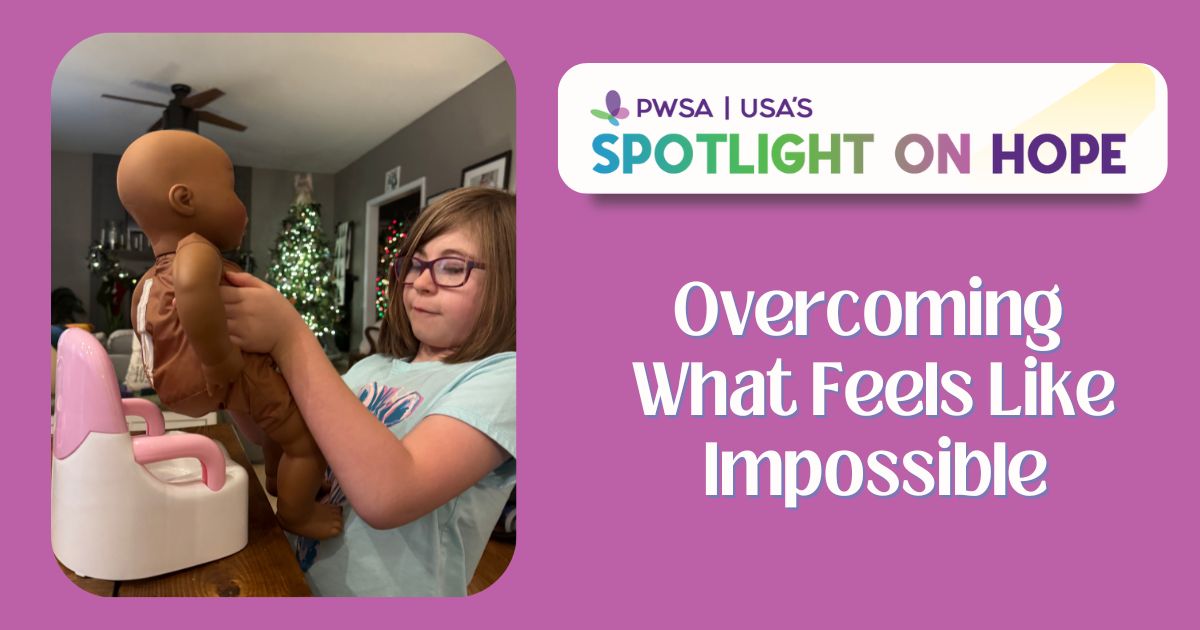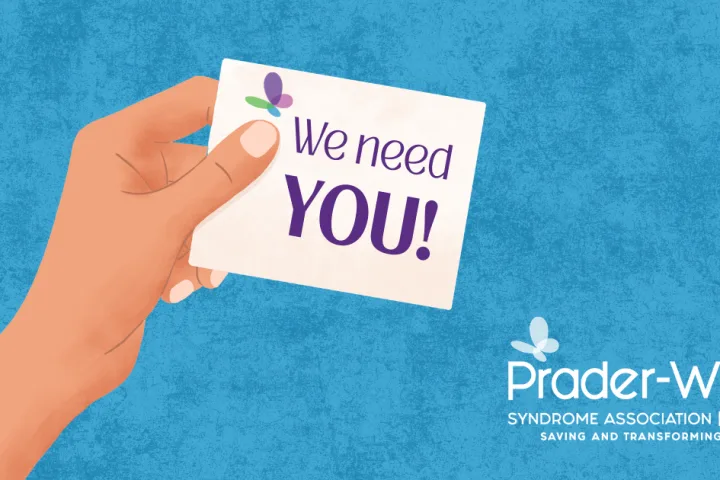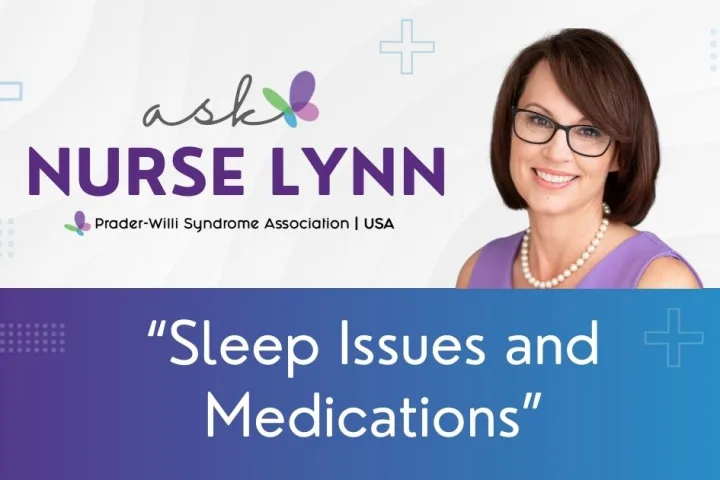contributed by Sheri Mills
Potty training…It’s a big milestone, and one that is hard for our kids.
We started at 2, and Lyra just couldn’t “feel” to let go or even that her bladder was full. That’s low muscle tone for you. We stopped and came back to it again at three. We found the same issue. We stopped and came back to it at four. You guessed it! Stopped and came back to it at five. This time with the help of our private occupational therapist, who helped Lyra by pictures and actions. “This week we are just going to sit on the potty, with clothes on.” The next week, we’d try something else. It also didn’t stick. So, we stopped again. All these times were not a waste though. They all helped Lyra build a foundation. She just wasn’t ready.
We also struggled with her wanting to do other milestones first. If there is one thing I know, it’s that she can only truly focus on one thing at a time. We couldn’t do potty training and advances in her speech. So, we pushed it off. Sure we wanted her potty trained, but we wanted her to communicate with us more.
Then at six, we heard about a potty parent lead trial led by a grad student working with Dr. Kasey Bedard, BCBA. We’ve done parent led trials with Dr. Bedard for ABA and repetitive asking. We signed up! But we needed Lyra’s verbal consent. Something that didn’t come easily. So we hung it up for a few months, and talked about it more openly at home.
Suddenly it all clicked. Seriously, she was just ready. There was nothing I could have done before that would have made her consent sooner. That’s also the thing about our kids. They are stubborn, and do things when they are ready. Here’s the other thing… the milestones are always hit. It’s just on their own time.
In 31 days, she was potty trained!
I’m sharing that the program is amazing. I’m sharing that pushing doesn’t always help. I’m sharing that milestones always happen.
Hope.
We just have to hope someday it happens.
It always does!
Now the student is the teacher! Teaching her baby dolls how to go.
Share your Spotlight on Hope
We want to celebrate the successes of your loved ones with PWS. From first steps to climbing a volcano, no matter how big or small, we want to share with the community your Spotlight on Hope.
Share this!





 Perry A. Zirkel has written more than 1,500 publications on various aspects of school law, with an emphasis on legal issues in special education. He writes a regular column for NAESP’s Principal magazine and NASP’s Communiqué newsletter, and he did so previously for Phi Delta Kappan and Teaching Exceptional Children.
Perry A. Zirkel has written more than 1,500 publications on various aspects of school law, with an emphasis on legal issues in special education. He writes a regular column for NAESP’s Principal magazine and NASP’s Communiqué newsletter, and he did so previously for Phi Delta Kappan and Teaching Exceptional Children. Jennifer Bolander has been serving as a Special Education Specialist for PWSA (USA) since October of 2015. She is a graduate of John Carroll University and lives in Ohio with her husband Brad and daughters Kate (17), and Sophia (13) who was born with PWS.
Jennifer Bolander has been serving as a Special Education Specialist for PWSA (USA) since October of 2015. She is a graduate of John Carroll University and lives in Ohio with her husband Brad and daughters Kate (17), and Sophia (13) who was born with PWS. Dr. Amy McTighe is the PWS Program Manager and Inpatient Teacher at the Center for Prader-Willi Syndrome at the Children’s Institute of Pittsburgh. She graduated from Duquesne University receiving her Bachelor’s and Master’s degree in Education with a focus on elementary education, special education, and language arts.
Dr. Amy McTighe is the PWS Program Manager and Inpatient Teacher at the Center for Prader-Willi Syndrome at the Children’s Institute of Pittsburgh. She graduated from Duquesne University receiving her Bachelor’s and Master’s degree in Education with a focus on elementary education, special education, and language arts. Evan has worked with the Prader-Willi Syndrome Association (USA) since 2007 primarily as a Crisis Intervention and Family Support Counselor. Evans works with parents and schools to foster strong collaborative relationships and appropriate educational environments for students with PWS.
Evan has worked with the Prader-Willi Syndrome Association (USA) since 2007 primarily as a Crisis Intervention and Family Support Counselor. Evans works with parents and schools to foster strong collaborative relationships and appropriate educational environments for students with PWS. Staci Zimmerman works for Prader-Willi Syndrome Association of Colorado as an Individualized Education Program (IEP) consultant. Staci collaborates with the PWS multi-disciplinary clinic at the Children’s Hospital in Denver supporting families and school districts around the United States with their child’s Individual Educational Plan.
Staci Zimmerman works for Prader-Willi Syndrome Association of Colorado as an Individualized Education Program (IEP) consultant. Staci collaborates with the PWS multi-disciplinary clinic at the Children’s Hospital in Denver supporting families and school districts around the United States with their child’s Individual Educational Plan. Founded in 2001, SDLC is a non-profit legal services organization dedicated to protecting and advancing the legal rights of people with disabilities throughout the South. It partners with the Southern Poverty Law Center, Protection and Advocacy (P&A) programs, Legal Services Corporations (LSC) and disability organizations on major, systemic disability rights issues involving the Individuals with Disabilities Education Act (IDEA), Americans with Disabilities Act (ADA), and the federal Medicaid Act. Recently in November 2014, Jim retired.
Founded in 2001, SDLC is a non-profit legal services organization dedicated to protecting and advancing the legal rights of people with disabilities throughout the South. It partners with the Southern Poverty Law Center, Protection and Advocacy (P&A) programs, Legal Services Corporations (LSC) and disability organizations on major, systemic disability rights issues involving the Individuals with Disabilities Education Act (IDEA), Americans with Disabilities Act (ADA), and the federal Medicaid Act. Recently in November 2014, Jim retired.